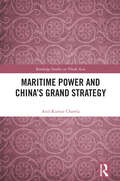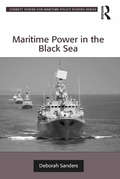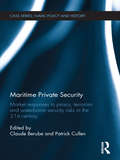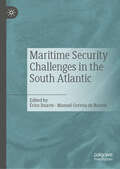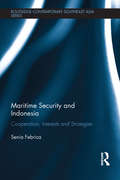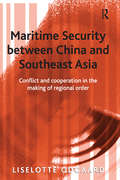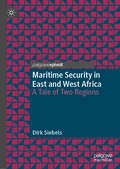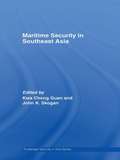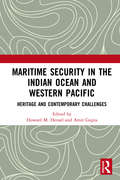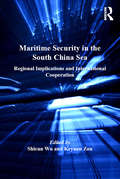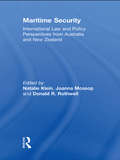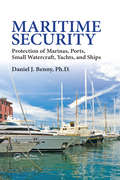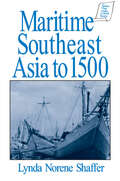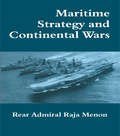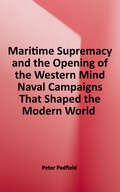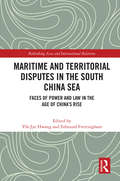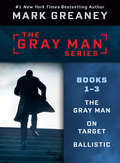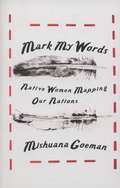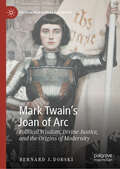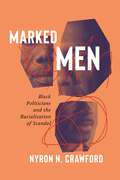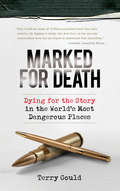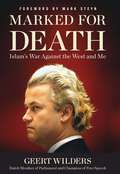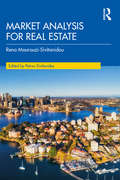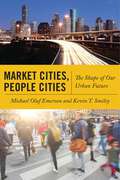- Table View
- List View
Maritime Power and China's Grand Strategy (Routledge Studies on Think Asia)
by Anil Kumar ChawlaThis book examines the role of maritime power in the ‘Chinese Dream’ of becoming the pre-eminent global power by 2049, a century after the establishment of the People’s Republic of China (PRC). The book argues that China seeks to use its maritime power as part of its quest to attain Great Power status by employing it to these areas: provide deterrence in the maritime domain; assure availability of resources; protecting its sea lines of communication; and in the economic domination of specific developing countries in Asia, Africa, Oceania and South America. Based on a careful examination of primary sources, especially China’s defence white papers and essential works on the topic by prominent Chinese military analysts and institutions, the author systematically unpacks interpretations and analysis of China’s evolving concepts of maritime power. The book traces China’s development and use of maritime power over its long-recorded history, especially from the time it became the People’s Republic of China (1950) to the present (2024) and links the country's maritime past with the present. A comprehensive and detailed study of the evolution of Chinese concepts of maritime power and how it forms an important part of the rejuvenation of the nation and the projection of China as a global power by mid-century, this book will be of interest to researchers studying Asian and Chinese Studies, Military Studies and policy makers at think tanks and government agencies.
Maritime Power in the Black Sea (Corbett Centre for Maritime Policy Studies Series)
by Deborah SandersMaritime Power in the Black Sea provides the first comprehensive assessment and evaluation of the comparative maritime power of the six littoral states in the Black Sea - Turkey, Russia, Ukraine, Georgia, Romania and Bulgaria. This book examines the maritime capabilities and assets of each of the six littoral Black Sea states and also considers the implications of the distribution of maritime power on both regional and international security. As such it makes an important contribution to the debate about what constitutes maritime power in the twenty first century and provides a thematic comparative study of the ability of each of the littoral states of the Black Sea to project maritime power.
Maritime Private Security: Market Responses to Piracy, Terrorism and Waterborne Security Risks in the 21st Century (Cass Series: Naval Policy and History)
by Patrick Cullen Claude BerubeThis book examines the evolution, function, problems and prospects of private security companies in the maritime sector. The private security industry continues to evolve after its renaissance over the past few decades, first in Africa, and later in Iraq and Afghanistan. Despite this, little academic work has been done to date on the role of private security in the maritime environment. This lacuna has become more pronounced as the threat of piracy, terrorism, and other acts of maritime political violence have caused littoral states and commercial entities alike to consider the use of private security to mitigate risks. Maritime Private Security is an edited volume specifically dedicated to combating the absence of academic research in this area. The discussion of this multi-faceted subject is organised into four key parts: Part I: The Historical and Contemporary Market in Maritime Private Security Services Part II: The Emergence of Private Anti-Piracy Escorts in the Commercial Sector Part III: The Privatization of Coast Guard Services Part IV: Private Security Responses to Maritime Terrorism This book will be of much interest to students of naval policy and maritime security, private security companies, piracy and terrorism, international law and IR in general.
Maritime Security Challenges in the South Atlantic
by Érico Duarte Manuel Correia de BarrosThis edited volume focuses on the South Atlantic regional and national issues with maritime implications: naval policy, security, transnational organized crime, and Europe's legacy and current influence. The work analyzes the positions in favor and against NATO’s extended role in the South Atlantic, the historical and current issues related to the Falklands War, the African national deficits, and initiatives to attend the regional maritime problems. Including contributions from Angolan, Brazilian, Senegalese, and US collaborators, the volume offers eclectic conceptual frameworks, rich historical backgrounds, updated data, original analysis models, and policy recommendations.
Maritime Security and Indonesia: Cooperation, Interests and Strategies (Routledge Contemporary Southeast Asia Series)
by Senia FebricaIndonesia is the largest archipelago state in the world comprising 17,480 islands, with a maritime territory measuring close to 6 million square kilometres. It is located between the two key shipping routes of the Pacific and Indian Ocean. Indonesia’s cooperation in maritime security initiatives is vitally important because half of the world’s trading goods and oil pass through Indonesian waters, including the Straits of Malacca, the Strait of Sunda and the Strait of Lombok. This book analyses Indonesia’s participation in international maritime security cooperation. Using Indonesia as a case study, the book adopts mixed methods to assess emerging power cooperation and non-cooperation drawing from various International Relations theories and the bureaucratic politics approach. It addresses not only the topic of Indonesia’s cooperation but also engages in debates across the International Relations, political science and policy studies disciplines regarding state cooperation. Based on extensive primary Indonesian language sources and original interviews, the author offers a conceptual discussion on the reasons underlying emerging middle power participation or non-participation in cooperation agreements. The analysis offers a fresh perspective on the growing problems of maritime terrorism and sea robbery and how an emerging power deals with these threats at unilateral, bilateral, regional and multilateral levels. The book fills a significant gap in literature on Indonesian foreign policy making in the post-1998 era. It provides the first in-depth study of Indonesia’s decision making process in the area of maritime security and will thus be of interest to researchers in the field of comparative politics, international relations, security policy, maritime cooperation, port and shipping businesses and Southeast Asian politics and society.
Maritime Security between China and Southeast Asia: Conflict and Cooperation in the Making of Regional Order
by Liselotte OdgaardArguing that security relations between China and Southeast Asia are profoundly affected by disputes over maritime space and territory in the South China Sea, the author demonstrates that the primacy of strategic competition over strategic partnerships promotes the emergence of a structure of deterrence, encouraging South East Asia to side with the United States to balance the military power of China. Combining the concepts of international disputes and order, the book establishes a framework designed to focus on periods of transition where international regulatory mechanisms are out of step with developments in the security environments of states. Features include: - Substantial evidence that strategic competition between the United States, China and South East Asia promotes stability. - A comprehensive account of military, diplomatic, economic, historical and legal aspects of security environments of states. Suitable for scholars and graduate students of international relations, international law, security studies, conflict management and regionalism, it will also be invaluable supplementary reading for undergraduate courses.
Maritime Security in East and West Africa: A Tale of Two Regions
by Dirk SiebelsThis book examines the nexus between maritime security and the ‘blue economy’ in sub-Saharan Africa. In recent years, maritime security issues have received increasing attention, but academic and policy-related discussions are largely limited to counter-piracy operations and, to a smaller extent, problems related to illegal fishing. This project offers an essential addition to the current academic and political discourse, combining a broad range of statistics with primary research and findings from more than 40 interviews with key stakeholders. It provides a unique analysis, recognizing that maritime security is not an end in itself but rather linked to economic and immaterial benefits of a more secure environment at sea.
Maritime Security in Southeast Asia (Routledge Security in Asia Series)
by Kwa Chong Guan John K. SkoganThis book confronts both the maritime security challenges and responses. In Southeast Asia, maritime security has, over the last twenty years, taken on a much greater importance, due to the Law of the Sea convention, which has resulted in a 200 nautical mile Exclusive Economic Zones (EEZs). As well as traditional security threats to maritime security, there has also emerged a range of non-traditional threat, such as those emanating from piracy and international terrorism that spill over into the maritime domain. Events such as September 11th, and the designation of Southeast Asia as a 'second front' in the war against terrorism, have resulted in the growing realization that multilateral security cooperation is required in order to better manage emerging security threats. Expert contributors to this book identify the nature of the maritime security problem and critically evaluate the various responses with an eye to improving the management of prevailing and emerging security threats. This book will be an invaluable resource to academics, policy analysts, legislators and students interested in security issues in Southeast Asia.
Maritime Security in the Indian Ocean and Western Pacific: Heritage and Contemporary Challenges
by Amit Gupta Howard M. HenselScholars and policy makers have traditionally viewed portions of the Indian Ocean and the Western Pacific as separate and discrete political, economic, and military regions. In recent years, however, a variety of economic, political, and military forces have made many within the academic community, as well as a growing number of national governmental leaders, change their perceptions and recognize that these maritime expanses are one zone of global interaction. Consequently, political, military, and economic developments in one maritime region increasingly have an impact elsewhere. <P><P> Analyzing and assessing the contemporary maritime challenges in the Indian Ocean and the Western Pacific, this valuable study highlights the current prospects for peace and security in what is rapidly becoming recognized as an integrated and interactive political, military-strategic, and economic environment. <P><P> This work will be of interest to researchers and policy makers involved in regional studies, as well as security studies, conflict resolution, military, and peace studies.
Maritime Security in the South China Sea: Regional Implications and International Cooperation (Corbett Centre for Maritime Policy Studies Series)
by Shicun WuMaritime security is of vital importance to the South China Sea, a critical sea route for maritime transport of East Asian countries including China. The adjacent countries have rendered overlapping territorial and/or maritime claims in the South China Sea which complicate the situation of maintaining maritime security and developing regional cooperation there. This book focuses on contemporary maritime security in the South China Sea as well as its connected sea area, the Straits of Malacca and Singapore. It identifies and examines selected security issues concerning the safety of navigation, crackdown on transnational crimes including sea piracy and maritime terrorism, and conflict prevention and resolution. In the context of non-traditional security, issues such as maritime environmental security and search and rescue at sea are included. The book explores ways and means of international cooperation in dealing with these maritime security issues.
Maritime Security of the Arab Gulf States: Analysis of Current Threats, Confrontation Mechanisms, and Future Challenges
by Ashraf Mohammed KeshkThis book outlines the state of play in maritime security in the Gulf and provides a historical perspective to current issues while also surveying different mechanisms for Gulf maritime security, both at the collective and individual state levels.The book addresses a number of questions related to maritime security in the Gulf States, such as what are the main threats facing maritime security? Do the Arab Gulf States have the necessary naval capabilities to confront these maritime security threats? What are the efforts that the Arab Gulf States have made in order to maintain their maritime security? What are the regional frameworks through which the Arab Gulf States can address maritime security threats? And what are the obstacles hindering the Arab Gulf States’ efforts to maintain maritime security?This book would be a valuable read for Gulf Cooperation Council States, the ministries of defense in the Arabian Gulf countries, security institutions, the Arabian Gulf countries’ military academies, thinks tanks and universities in the six Gulf States, Western think thanks concerned with the Arabian Gulf region, and scholars specializing in Arabian Gulf countries.
Maritime Security: International Law and Policy Perspectives from Australia and New Zealand
by Donald R. Rothwell Natalie Klein Joanna MossopMaritime security is of vital importance to Australia and New Zealand as both countries depend on maritime transport for their economic survival. Since the events of September 11th 2001, significant questions have been raised as to whether Australia and New Zealand are adequately prepared for the consequences of a major disruption to global shipping following a terrorist attack on a leading regional port such as Hong Kong or Singapore. Considerable efforts have also been undertaken to improve responses to an array of maritime security threats, such as transnational crime, environmental pollution, and piracy and armed robbery. This volume identifies those issues that particularly affect Australia and New Zealand’s maritime security, evaluating the issues from legal and political perspectives, and proposes methods for improving maritime security in the two countries. While the focus is primarily on Australia and New Zealand, the scope extends to regional considerations, addressing matters related to Pacific Island states, Southeast Asia and the Antarctic and sub-Antarctic region. The book also addresses strategic partnerships examining the influence of the United States, and analyses issues within the broad framework of international law and politics. Maritime Security: International Law and Policy Perspectives from Australia and New Zealand will be of great interest to scholars of international law, international relations and maritime affairs, maritime industry professionals, private and government lawyers, as well as diplomats, consuls and government officials.
Maritime Security: Protection of Marinas, Ports, Small Watercraft, Yachts, and Ships
by Ph.D, Daniel BennyIn a time when threats against the maritime community have never been greater, Maritime Security: Protection of Marinas, Ports, Small Watercraft, Yachts, and Ships provides a single, comprehensive source of necessary information for understanding and preventing or reducing threats to the maritime community.The book defines what comprises the mariti
Maritime Southeast Asia to 500
by Lynda Norene ShafferA history of the fabled islands of Southeast Asia from 300 BC, by which time their inhabitants had learned to sail the monsoon winds, to AD 1528, when Islam became dominant in the region.
Maritime Strategy and Continental Wars (Cass Series: Naval Policy and History #No. 3)
by Rear Admiral MenonRear Admiral Raja Menon contends that nations embroiled in Continental wars have historically had poor maritime strategies. He develops the argument that navies that have been involved in such wars have made poor contributions to politial objectives, and outlines future strategies.
Maritime Supremacy and the Opening of the Western Mind: Naval campaigns that Shaped the Modern World
by Peter PadfieldIn the great wars of modern history, maritime powers have always prevailed over land-based empires, whether Habsburg, Napoleonic, Nazi or Soviet. In contrast to the rigid hierarchies and centralisation of land-based empires, those nations attaining mastery at sea have been distinguished by liberty, flexibility and enterprise. The seventeenth-century Dutch were the first to achieve naval and trading dominance and, exploring the effects on daily life, industry, art and thought, finance and power politics, Peter Padfield reveals the Dutch in their golden age as the heralds of modern Western society. The British took over the Dutch system of naval, trading and world supremacy in the eighteenth century and were, in their turn, displaced by the United States in the twentieth. This book carries the story from the defeat of the Armada in 1588 to the American Revolutionary War and Rodney's victory. Maritime Supremacy and the Opening of the Western Mind charts the growth of linked strengths – sea-fighting, trading, financial and constitutional – which made empires so formidable, and reveals how supremacy at sea freed thought and society itself.
Maritime and Territorial Disputes in the South China Sea: Faces of Power and Law in the Age of China’s rise (Rethinking Asia and International Relations)
by Yih-Jye Hwang, Edmund FrettinghamThis edited volume rethinks the relationship between power and law in the age of China’s rise by examining recent developments in the South China Sea (SCS). The contributors explore different interpretations of international law on the legal status of the contested islands and rocks and provide detailed analyses of the contested concepts and provisions, the 2016 ruling by the SCS arbitration tribunal, as well as the environmental, economic, and political impacts of the ruling. This book facilitates a more meaningful and productive dialogue over the intersection, interaction, and interdependence between power and law in the context of the SCS. Assessing the interactions between political, legal, and normative forces, it provides insights into the specific dynamics of the dispute and the shifting security landscape in the region, but also offers a basis for thinking more deeply about the broader rise of China. This book will appeal to both students and scholars of IR, International Law, and Asian Studies and those engaged in research on the SCS disputes, the rise of China, and with a theoretical interest in law and power in international affairs.
Mark Greaney's Gray Man Series: THE GRAY MAN, ON TARGET, BALLISTIC (Gray Man)
by Mark GreaneyThe first three novels in #1 New York Times bestselling author Mark Greaney&’s Gray Man series—available together for the first time.&“The Gray Man novels blow all other thrillers away!&”—Brad Thor, #1 New York Times bestselling author of Black IceTo those who lurk in the shadows, he&’s known as the Gray Man. He is a legend in the covert realm, moving silently from job to job, accomplishing the impossible and then fading away. And he always hits his target. Always.But there are forces more lethal than Gentry in the world. Forces like money. And power. And there are men who hold these as the only currency worth fighting for. Now, Court Gentry is going to prove that, for him, there&’s no gray area between killing for a living and killing to stay alive….This eBook collection includes:THE GRAY MANON TARGETBALLISTIC
Mark My Words: Native Women Mapping Our Nations
by Mishuana GoemanThe book argues that it is vital to refocus the efforts of Native nations beyond replicating settler models of territory, jurisdiction, and race. Through an examination of twentieth-century Native women’s poetry and prose, Goeman illuminates how these works can serve to remap settler geographies and center Native knowledges. She positions Native women as pivotal to how our nations, both tribal and nontribal, have been imagined and mapped, and how these women play an ongoing role in decolonization. In a strong and lucid voice, Goeman provides close readings of literary texts, including those of E. Pauline Johnson, Esther Belin, Joy Harjo, Leslie Marmon Silko, and Heid Erdrich. In addition, she places these works in the framework of U.S. and Canadian Indian law and policy. Her charting of women’s struggles to define themselves and their communities reveals the significant power in all of our stories.
Mark Twain’s Joan of Arc: Political Wisdom, Divine Justice, and the Origins of Modernity (Recovering Political Philosophy)
by Bernard J. DobskiThis book is about the political wisdom embodied in Personal Recollections of Joan of Arc by Mark Twain, the self-declared best book by arguably America’s greatest author. More precisely, this study illuminates Twain’s political wisdom by examining his approach to the theological-political problem; it takes up Twain’s handling of the question of whether a providential deity intervenes in human affairs so as to effectuate divine justice on earth and it does this through a commentary on his last complete novel. Through this investigation, Twain prompts his audience to explore the natural, conventional, or divine basis for justice in political life. Such a study is critical for understanding Twain’s corpus, concerned as it is with the tension between material determinism and moral agency. Dobski argues that Twain’s last novel prepares his readers to adopt a “new” understanding of man and his relationship to God, his country, and his fellow man.
Marked Men: Black Politicians and the Racialization of Scandal
by Nyron N. CrawfordExamines Black Americans’ suspicion about the potential political harassment of Black elected officialsIn Marked Men, Nyron N. Crawford offers a novel perspective on political scandal, corruption, and racial politics in the United States. Contrary to traditional beliefs that politicians are forgiven for their transgressions because of the benefits they provide their constituents, Crawford argues that Black Americans view political misdeeds by Black elected officials through a lens of suspicion towards the criminal legal system.Crawford’s work reveals that Black Americans often question the motivations behind investigations and indictments of Black politicians, expressing concern that such actions by the state are intended to undermine, embarrass, and harass Black leaders. Through a mixed-method approach including experiments, case studies, and survey data, Crawford illustrates that racialized suspicion shapes the way Black voters rally to protect their embattled Black political representatives.The book challenges conventional wisdom by highlighting how a tolerance of corruption is not the driving force behind the support for wayward politicians. Instead, racialized mistrust of the criminal justice system plays a pivotal role. By shedding light on this dynamic, Marked Men examines the complexities of political scandals and the intricate interplay between race and politics in contemporary America. The study calls for a deeper understanding of the motivations and attitudes of Black voters, prompting readers to reconsider prevailing assumptions about political accountability and forgiveness in the context of race.
Marked for Death: Dying for the Story in the World's Most Dangerous Places
by Terry GouldWorldwide, nearly three-quarters of journalists who die on assignment are targeted and assassinated for their dogged pursuit of important stories of injustice. In Marked for Death, Terry Gould brings this statistic to life by documenting the lives of seven journalists, in Colombia, the Philippines, Bangladesh, Russia, and Iraq, who had the guts to keep telling the truth in the face of threats from terrorists, corrupt politicians, gangsters, and paramilitary leaders.Gould brings us the lovers, colleagues, rivals, critics, and even the accused murderers of these courageous men and women, searching for the moment in which these journalists understood that they were willing to die in order to get a story out.Their compelling stories highlight how selflessly humans can love justice and their fellow citizens; how dogged and resourceful people can be in attempts to thwart injustice; how vital it is to show the defeated and the indifferent, as well as the powerful; and that there really are some things worth dying for.
Marked for Death: Islam's War Against the West and Me
by Geert WildersMarked for DeathFanatics, terrorists, and appeasers have tried everything to silence Geert Wilders, Europe's most controversial Member of Parliament--from putting him on trial to putting a price on his head. But Wilders refuses to be silenced--and one result is the book you have in your hands.For years, from his native Netherlands, Wilders has sounded the alarm about the relentless spread of Islam in the West. And he has paid a steep personal price, enduring countless death threats and being forced into a permanent state of hiding.Now, for the first time, Wilders offers a full account of his long battle against the zealots who have already slaughtered his countryman Theo van Gogh--whose killer also threatened to murder Wilders himself.In Marked for Death, Wilders reveals:How--and why--liberal politicians, including Barack Obama, downplay the Islamic threatThe systematic suppression of free speech through lawsuits, prosecutions, threats, and violence meted out against Islam's criticsThe untold story: how Islamic groups are redefining human rights to suppress non-Muslims everywhereThe true, bloody history of Islam's spread throughout the worldHow the West can defend itself against an existential enemy determined to conquer the globeExpelled from Britain, banned from Indonesia, denounced by the UN Secretary General, prosecuted in court for his beliefs, forced into government safe houses, and constantly threatened with death, Geert Wilders is unbowed and unapologetic. Marked for Death is a stark warning about a growing threat to our liberties written by a man who has lost his freedom-and would not see the rest of us suffer the same fate.
Market Analysis for Real Estate
by Rena Mourouzi-SivitanidouMarket Analysis for Real Estate is a comprehensive introduction to how real estate markets work and the analytical tools and techniques that can be used to identify and interpret market signals. The markets for space and varied property assets, including residential, office, retail, and industrial, are presented, analyzed, and integrated into a complete understanding of the role of real estate markets within the workings of contemporary urban economies. Unlike other books on market analysis, the economic and financial theory in this book is rigorous and well integrated with the specifics of the real estate market. Furthermore, it is thoroughly explained as it assumes no previous coursework in economics or finance on the part of the reader. The theoretical discussion is backed up with numerous real estate case study examples and problems, which are presented throughout the text to assist both student and teacher. Including discussion questions, exercises, several web links, and online slides, this textbook is suitable for use on a variety of degree programs in real estate, finance, business, planning, and economics at undergraduate and MSc/MBA level. It is also a useful primer for professionals in these disciplines.
Market Cities, People Cities: The Shape of Our Urban Future
by Michael Oluf Emerson Kevin T. SmileyAn in-depth look at the urban environments of Houston and CopenhagenHow are modern cities changing, and what implications do those changes have for city inhabitants? What kinds of cities do people want to live in, and what cities do people want to create in the future? Michael Oluf Emerson and Kevin T. Smiley argue that western cities have diverged into two specific and different types: market cities and people cities. Market cities are focused on wealth, jobs, individualism, and economic opportunities. People cities are more egalitarian, with government investment in infrastructure and an active civil society. Analyzing the practices and policies of cities with two separate foci, markets or people, has substantial implications both for everyday residents and future urban planning and city development. Market Cities, People Cities examines these diverging trends through extended case studies of Houston, Texas as a market city and Copenhagen, Denmark as a people city, and draw on data from nearly 100 other cities. Emerson and Smiley track the history of how these two types of cities have been created, and how they function for governments and residents in various ways, examining transportation, the environment, and inequality, among other topics. Market Cities, People Cities also outlines the means and policies cities can adapt in order to become more of a market- or people-focused city. The afterword reflects on Houston’s response to the devastation caused by Hurricane Harvey in 2017. As twenty-first century cities diverge, Market Cities, People Cities is essential for urban dwellers anxious to be active in their pursuit of their best cities, as well as anyone looking to the future of cities around the world.
